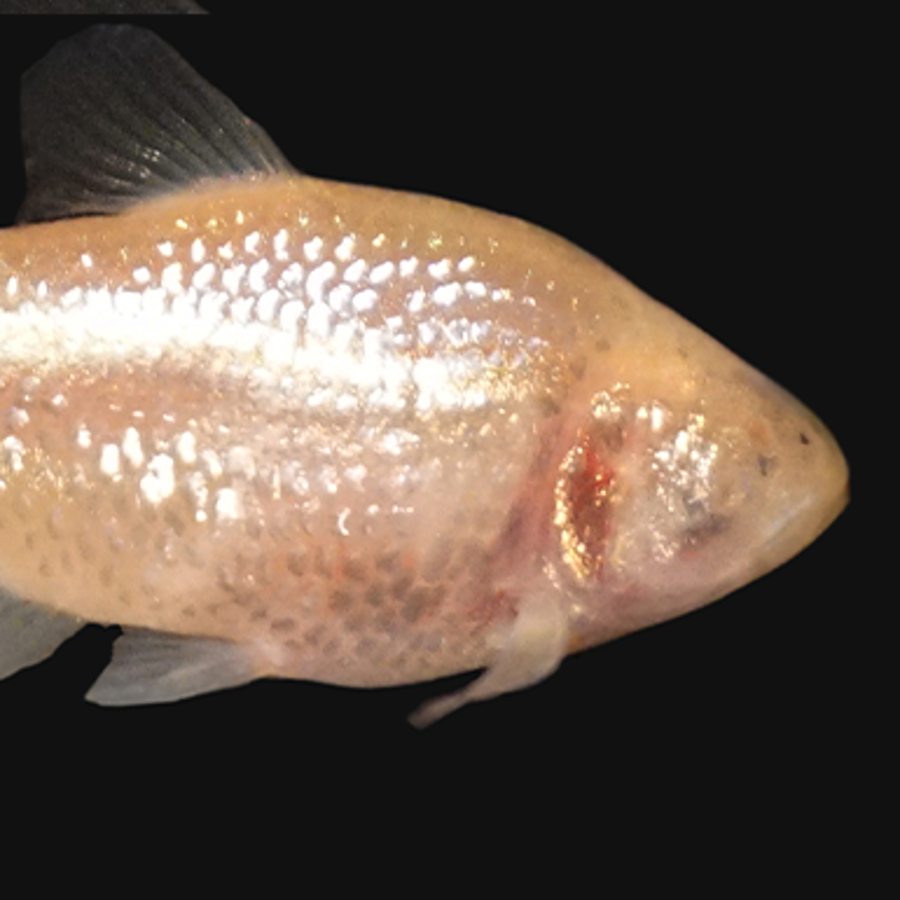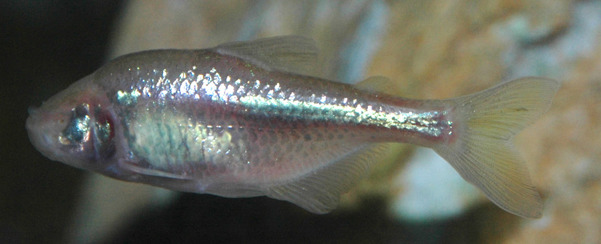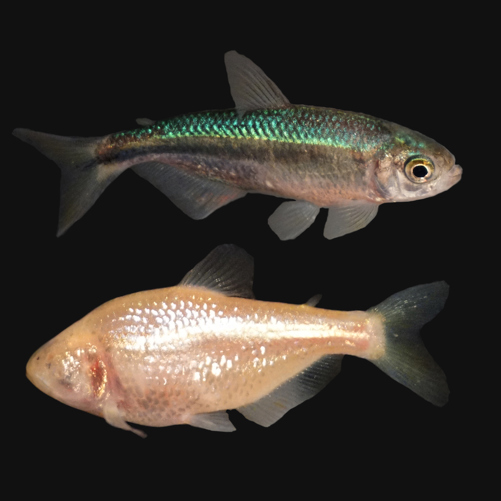
Why do cave fish lose their eyes?
August 10, 2006

- Related Topics:
- Vision,
- Animal biology,
- Mutation,
- Evolution
A curious adult from California asks:
"Why when a fish goes into a cave does it eventually lose its eyes? In other words, why did the eyes of cave fish disappear?"
This is such a great question. The short answer is that there was an advantage to losing their eyes.
But for me at least, the advantage was totally unexpected. Believe it or not, losing their eyes made them better at getting food.
Use it or lose it?
Now it could have been something simpler. Maybe the eyes just went away through disuse. In fact, this is what Charles Darwin hypothesized in the Origin of Species. How might this happen?
Well, DNA gets small changes all the time. These "random mutations" happen because cells make mistakes or something in the environment damages the DNA.
Imagine that one of these changes affected eye development. If you're a fish and you need your eyes, this is going to be a mutation that puts you at a disadvantage. Most likely you'll be eaten before you can pass the mutation on.
But if you're in the dark, this mutation will be tolerated. You can't see anyway so who needs the eyes?

Something similar is happening to people and their smell receptors. People just don't need smell receptors like they used to. When you look at people's DNA, you can see that different people have different receptors knocked out.
This is why what smells good to one person can have no smell for another. But this doesn't seem to have happened with these fish's eyes. Why not?
An evolutionary advantage
Because unlike our smell receptors, different fish populations have all lost their eyes the same way. There are over 2000 genes involved in eye development. If the eyes were lost simply to DNA deterioration, you would expect that different genes might be mutated in different fish.
But that isn't what we see. The fish all seem to start to develop eyes and then, through an orderly process, the eye disappears. This sort of cell death happens all the time, by the way.
For example, we all start out with webbed toes and fingers. But the cells in between our toes and fingers die off in an orderly process that gives us separate digits.
Also, dolphins start out growing back legs that then die off in an orderly way. The same thing seems to happen with these fish eyes.
So it isn't just through disuse (sorry Charlie). Something else has to be involved. I was thinking all sorts of things. Maybe they avoid eye infections by not having any eyes. Or maybe they can save energy by not making an eye. No, the real answer is much more interesting.
What is apparently going on for at least one species of fish is that the advantage doesn't have to do with losing the eyes. This is just a byproduct of the advantage.
The real advantage has to do with developing teeth and bones that make the fish feed more efficiently. What does this have to do with eyes? Genetically, everything.
See, there is a master gene called hedgehog (don't blame me, I didn't name it). Hedgehog is involved in lots of different developmental pathways.
The way it works is that the hedgehog gene makes a certain amount of the protein hedgehog. This protein then goes on to turn on lots of other genes.
For example, hedgehog starts the ball rolling for eye development by turning on some genes. Some of those genes make proteins that turn on other genes. This cascade eventually leads to eyes.
And hedgehog turns on lots of other pathways too. The end result is eyes, teeth, bones, etc. But to get these things you need to make the right amount of hedgehog.
For example, if you make too little hedgehog, you end up with just one eye. Too much and you lose your eyes.
This seems to be what is happening in these cave fish. They are making extra hedgehog so they lose their eyes.
But they gain better teeth, bone structure, etc. and so are better at getting food. The fish is blind but is a better food gatherer.

Of course this is only an advantage in the dark. Nasty teeth, nice skull structure, and a tough hide won't help you if you can't see a predator coming! But if the fish is in total darkness, then you can get rid of the eyes and be stronger.
These byproducts of natural selection are amazing. And they may even apply to us.
One theory is that humans developed bigger brains because of the way their jaws developed. In other words, I am writing this article because my ancestors developed jaws that would let a human brain develop. Wow.
Of course, this is just a hypothesis at this point. But it shows how the unintended consequences of natural selection might create marvelous creatures. Like you.

Author: Dr. D. Barry Starr
Barry served as The Tech Geneticist from 2002-2018. He founded Ask-a-Geneticist, answered thousands of questions submitted by people from all around the world, and oversaw and edited all articles published during his tenure. AAG is part of the Stanford at The Tech program, which brings Stanford scientists to The Tech to answer questions for this site, as well as to run science activities with visitors at The Tech Interactive in downtown San Jose.
 Skip Navigation
Skip Navigation
